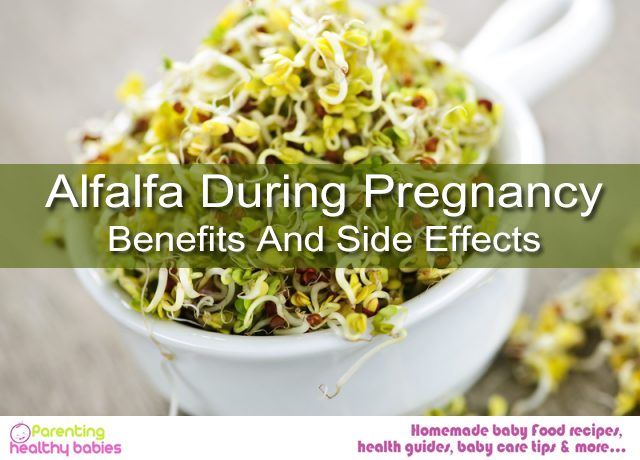Alfalfa During Pregnancy
Pregnancy is one of the happiest yet one of the most challenging times in the life of a woman. There will be innumerable people who will come up with suggestions and tips as what to do and what not to do during this time. While some will ask to eat something; others will ask to refrain from the same. Usually during pregnancy various kinds of supplements and herbs are recommended, but before taking them it is important to ensure whether they are safe or not. Among the various kinds of herbs which are suitable during pregnancy, alfalfa needs special mention.
Read More: 11 Safe Herbs Used in Pregnancy
What is alfalfa?
Alfalfa is an herb, which is extremely powerful. This herb contains various kinds of essential minerals, which include magnesium, calcium, iron, sulfur, potassium, sodium, chlorine, phosphorus, silicon and other trace elements. The herb is also a rich source of various kinds of vitamins, including vitamin C, vitamin E and vitamin K. Vitamin K is an important component which helps in blood clotting. The herb also contains different kinds of essential amino acids.
Read More: Prenatal vitamins: Can I take them without being pregnant?
What is the use of alfalfa?
There are different uses of alfalfa. While some are for everyone, some are specifically for pregnant women.
-
For everyone
- Helps in bettering blood clotting thanks to vitamin K present in the herb
- Helps in reducing blood pressure and cholesterol
- Helps in promoting healthy digestion
- Helps in easing gout
- Helps in supporting the pituitary gland
- Helps in reversing the process of tooth decay. Also plays a pivotal role in re-mineralizing teeth
- Helps in alleviating allergies
- Helps in treating all kinds of arthritis
- Helps to strengthen the immune system
Read More: Vitamin K during Pregnancy: 7 Facts
-
For pregnant women
- Helps in easing morning sickness
- Helps in increasing milk supply in nursing mothers
- Good source of vitamin K. Drinking alfalfa tea or consuming alfalfa tablets in the last trimester of pregnancy helps in decreasing hemorrhage chances and reduces postpartum bleeding.
Read More: Postpartum Hemorrhage: Signs, Symptoms and Treatment
Use of alfalfa during pregnancy
Many doctors recommend taking alfalfa during pregnancy. If they do, it is good to follow the instructions. One of the best results of taking alfalfa during pregnancy is increasing production of breast milk. There are different ways in which alfalfa can be consumed. Some of them include:
- Making tea or concoctions from dried alfalfa leaves
- Taking alfalfa supplements in the form of tablets or tinctures
- Using fresh alfalfa leaves in soups or in other food preparations. Using cooked alfalfa sprouts in different kinds of salads
When taken in natural form and in the right quantities, lactating women gain greatly from his medicinal herb. The supply of breast milk is enhanced significantly with this herb.
Read More: 31 Foods to Increase Breast Milk Supply
Using alfalfa and breastfeeding – the connection
Considered as a galactagogue, alfalfa is an excellent ingredient which is very helpful in increasing production of breast milk. But for that there has to be control on the levels of alfalfa consumption too. The best thing to do is to consult the doctor and take alfalfa in recommended dosages. There might also be risks of some side effects taking place from alfalfa. Your doctor should tell you in details about the same as well.
Mentioned below are some side effects of alfalfa which might occur during breastfeeding:
- Consumption of alfalfa in excess can lead to various kinds of complications during pregnancy as well as during breast feeding. If you have been using alfalfa during the time of pregnancy, even in small amounts, it is recommended to stop using the same few weeks before the main due date. This is done to ensure that one does not have an oversupply of breast milk. However, if you are low on breast milk production after child birth, you can start adding alfalfa to the diet slowly and gradually. Do not consume a large quantity of the herb at a time.
- Consuming large quantities of alfalfa for lactating women is unsafe. The infant might get diarrhea by your consuming this herb. You might also face digestive problems or stomach upset from excess consumption of alfalfa.
- Due to the vitamin K component, there might be interference with anticoagulant medicines when alfalfa is taken.
There is no doubt that the consumption of alfalfa is great for pregnant and lactating ladies, but the right doses need to be known for best results.
